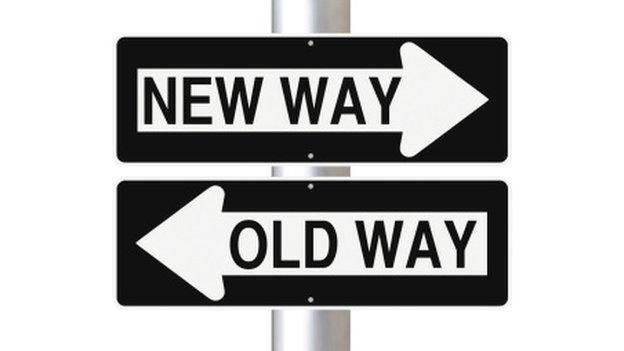Greater Manchester: The start of something big?
- Published

Ever since the NHS was created in 1948, it has remained separate to the council-run care system that oversees help in the home with tasks such as washing and dressing and care home places.
But as the decades have gone by and health care has shifted from curing illnesses to helping people manage long-term conditions such as dementia and heart disease, there has been an increasing sense that the two systems need to become more joined up.
All three main political parties have their own ideas of how this should be done - and NHS England chief executive Simon Stevens signalled his support for greater integration with the publication of his Five-Year Forward View last autumn.
But Greater Manchester has taken the bull by the horns and proposed a pooling of budgets.
At this stage (and it must be said the details are still emerging) it seems to mirror what is being rolled out in Scotland and what has happened in Northern Ireland since the 1970s. So will this catch on across the rest of England?
It could be argued it already has. From April there will be small pooled budgets in every 151 local authority areas - including the 10 boroughs in Greater Manchester - as part of the government's Better Care Fund initiative. They will be worth £5.3bn in total.
That represents less than 5% of the combined spending on health and care nationally, but is clearly a step towards full integration.

How will the Greater Manchester plan work?

Details are still sketchy, but documents seen by the BBC suggest that the plan would be to create a pan-Greater Manchester board of health and local government officials to oversee the £6bn combined health and care budget.
That would probably draw on money from several sources: the social care budgets held by the 10 local authorities, the regional funds NHS England control for specialist, complex care like heart surgery and the money held by the 12 local GP-led clinical commission groups for local health services, such as district nursing. It looks like this could take two years to get fully up-and-running.
What is not yet clear is where the ultimate accountability for all this money will lie. The words devolution suggest the Greater Manchester board will be in charge. But it would be a surprise if NHS England did not retain some kind of control on the health money which will make up the majority of the £6bn pot.

In theory, there is much to recommend this approach. By joining up budgets, it will allow Greater Manchester to plan the health and care of its population in a much more coordinated manner.
The need for this has never been more obvious. This winter, hospitals have increasingly started to struggle to discharge frail patients because of the lack of support available in the community.
That, of course, leads to blockages in the hospital system. It has also been suggested the lack of care is one of the factors behind the rise in attendances to A&E.
While the NHS budget has been protected this Parliament, the same cannot be said for social care.
Spending has fallen in real terms while the number of people receiving help has dropped by a quarter to 1.3m in the past four years alone.
Pooling of budgets also opens up the possibility of more innovative approaches to keeping people well.
For example, some local authorities have started funding home improvements on the basis that a warm home can do more for someone's health than medication.
However, for all the consensus on this issue, there is an elephant in the room.
Social care is means-tested, so everyone is expected to make a contribution towards their care - with many paying the full cost. If you integrate the two systems, where do you decide where one ends and the other starts?